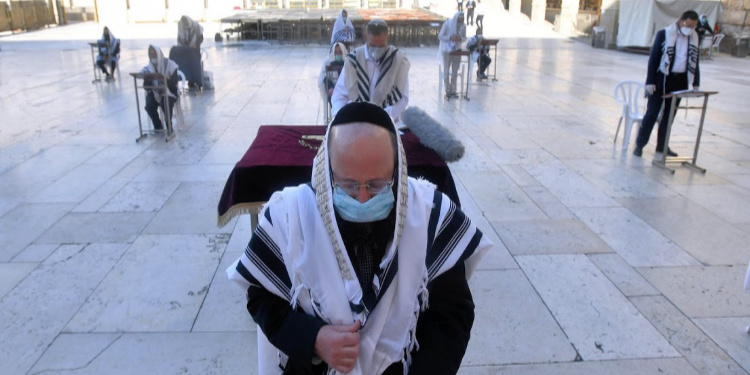From Purim to Shavuot — In and Out of the Coronavirus Lockdown
The Fellowship | May 21, 2020

One of the ways the Jewish holiday of Purim is celebrated is by wearing costumes and masks. Little did we know this year that just days after we celebrated this holiday in March, mask-wearing would become a way of life around the world.
In chapter nine of the biblical Book of Esther, which Jews read aloud every Purim, the first verse uses the words “v’nohofoch hu,” which can be loosely translated as “everything was turned upside down.” In the story of Purim, the wicked Haman was a high-ranking official in the palace of King Ahasuerus of Persia. Haman designed a plan to kill Mordechai, who was Jewish, along with all the Jews in the kingdom, because Mordechai refused to bow down to him at the gate of the palace. When the date for his plan arrived, v’nohofoch hu – everything was turned upside down –and not only were the Jews in the kingdom saved, but Haman and his ten sons were hanged on the gallows Haman had built to hang Mordechai on. What was supposed to be a tragic day for the Jewish people became a day of joy and celebration. The enemies of the Jews were killed and Mordechai was appointed to an important position in the palace.
Life in the Time of Quarantine
The past two months, while we have all been confined to our homes because of the coronavirus, most of our lives have been “v’nohofoch hu,” the opposite of what our lives are generally like. People who lead very hectic and busy lives were suddenly at home with children all day. Families were told “show your love for your grandparents by staying away from them.” Social distancing, frequent handwashing, and masks and gloves have been part of this strange experience.
Understandably, this period has been a great challenge for most people. In addition to intense family togetherness, schools, places of worship, businesses, and most stores have been closed. On top of this, many people have been put on unpaid vacations from work, and a large number have lost their jobs completely. This is a worldwide phenomenon, and it will take a long time for the economy to recover. In Israel, the unemployment rate has leaped to unprecedented highs. Yet compared to most Western countries, the number of deaths from the virus in Israel is low. While every person is a whole world and each fatality is a huge loss, it appears that the crisis was handled quite efficiently and effectively here, and the number of people diagnosed with the virus is smaller every day. While not everyone followed the guidelines, it appears that the majority of the population did.
Now the Israeli government, which has been going through its own continuing crisis and restructuring at the same time, has been gradually loosening the strict guidelines. People are going back to work, and children are returning to school. Stores that were closed are opening, with strict regulations about the number of customers that can come in at a time. The latest announcement is that synagogues will be open for up to 50 worshippers, who must of course continue to wear masks, stay two meters apart, and be strict about hygiene.
A Time of Prayer and Thanksgiving
Meanwhile, this week has brought a sweltering heat wave to Israel. Throughout the country, the temperature has gone into the high 30s Celsius (over 100 degrees Fahrenheit) and in some regions, into the 40s (104 Fahrenheit and higher). The extreme heat is expected to last until the end of the week, more consecutive days than ever before. I am hoping that the heat will somehow burn out the remains of the frightening virus that has had such a major effect on the world in the last two months.
At the end of next week, we will celebrate the holiday of Shavuot, which comes seven weeks after Passover. Shavuot commemorates the anniversary of the day God gave the Torah to the Jewish people on Mount Sinai, and at the same time is a celebratory holiday of the wheat harvest in the Land of Israel during biblical times. Let us hope and pray that this year Shavuot will also be a day when we can celebrate our good health and the health of people around the world.
Miriam Lock
